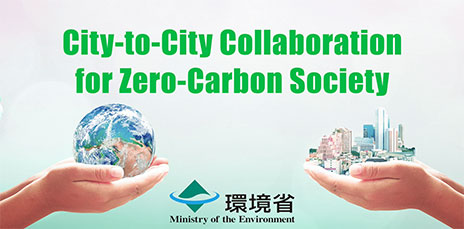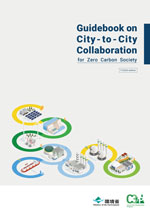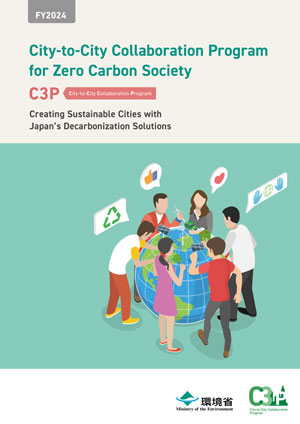City-to-City Collaboration Program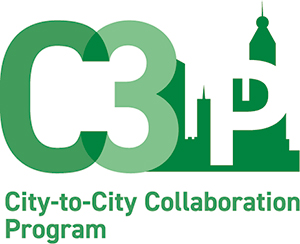
The Ministry of the Environment of Japan is promoting the City-to-City Collaboration for Zero Carbon Society program.
The reports of studies conducted so far under this program are listed in the “List of study reports”.
Program introduction video (Released in October 2022)
Contents: Program overview, decarbonization domino effects spreading overseas, other
Click here for YouTube.
Program introduction video (Released in December 2024)
Contents: Voices from participating cities, on-site survey, other
Click here for YouTube.
Overview of City-to-City Collaboration for Zero Carbon Society
Under this framework where cities in developing countries collaborate with cities in Japan, support is provided for human resources development and the creation of institutional foundations in cities in developing countries by considering the development of zero-carbon projects in collaboration with private companies and sharing knowledge and know-how on urban management in Japan through intercity collaboration.
Due to the concentration of various infrastructure in cities, the introduction and development of superior zero-carbon technologies, products, and systems in these facilities will not only help with the zero-carbon development of cities, but are also expected to produce various co-benefits, such as improving the environment and energy supply in cities.
Outline of City-to-City Collaboration Program
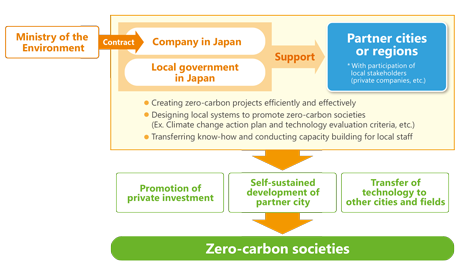
Image of exit strategies of the City-to-City Collaboration Program
(an example)
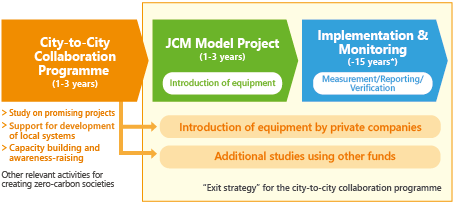
When introducing zero-carbon technologies on the ground, it will also be possible to utilize financial schemes under the Joint Crediting Mechanism (JCM) promoted by the Government of Japan.
What is the Joint Crediting Mechanism (JCM)?
The Joint Crediting Mechanism (JCM) is a mechanism jointly created and implemented under an agreement between the Government of Japan and a partner country’s government to achieve Japan’s GHG emissions reduction targets by quantitatively evaluating and understanding Japan’s contributions to the reduction/absorption of GHG emissions achieved through the spread of superior zero-carbon technologies (technologies/ products, systems, services, infrastructure, etc.) and the implementation of policies that can lead to a reduction in GHG emissions in developing countries.
JCM outline figure

JCM financial mechanisms: What is the JCM Model Project?
The JCM Model Project is a program to measure, report, and verify (MRV) the implementation of projects to reduce and absorb GHG emissions, as well as Japan’s contributions to the emission reduction effects with the use of superior zero-carbon technologies in JCM partner countries and developing countries where the JCM is expected to be implemented. If adopted, financial support will be provided for the introduction of equipment and machinery that use superior zero-carbon technologies.
Benefits for participating stakeholders
| Benefits for cities overseas |
|
|---|---|
| Benefits for companies overseas |
|
| Benefits for cities in Japan |
|
| Benefits for companies in Japan |
|
Documents for the City-to-City Collaboration Program
Old Pamphlets, Other
- Guidebook on City- to- City Collaboration for Zero Carbon Society (FY2019 edition) [PDF 4,952KB]
- 2023 City-to-City Collaboration for Zero Carbon Society [PDF 6.8MB]
- 2022 City-to-City Collaboration for Zero Carbon Society [PDF 10.7MB]
- 2021 City-to-City Collaboration for Zero Carbon Society [PDF 6,450KB]
- 2020 City-to-City Collaboration for Zero Carbon Society [PDF 3,710KB]
- 2019 City-to-City Collaboration for Low-Carbon Society [PDF 5,997KB]
- 2018 City-to-City Collaboration program for Low-Carbon Society [PDF 8,348KB]
- 2017 Creating Sustainable, Low-Carbon Cities through City-to-City Collaboration [PDF 1,427KB]
- 2017 City-to-City Collaboration program for Low-Carbon Society [PDF 2,596KB]
- 2016 The Joint Crediting Mechanism (JCM) Feasibility Study through City-to-City Collaboration [PDF 7,167KB]
- (October 2014) Feasibility Studies on Joint Crediting Mechanism (JCM) Projects towards Environmentally Sustainable Cities in Asia [PDF 4,226KB]
- (March 2014) Feasibility Studies on Joint Crediting Mechanism (JCM) Projects towards Environmentally Sustainable Cities in Asia [PDF 1,526KB]
Call for Proposals
Please visit websites below. Information is available only in Japanese.


